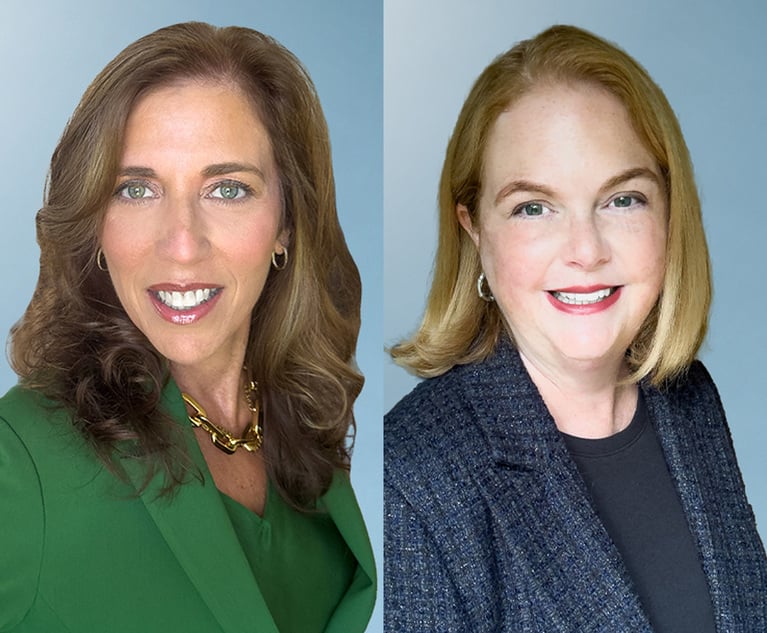Consider Retaining Outside Counsel for Ethics Issues
Handling ethics compliance issues can be one of the most difficult tasks inherent in running a law firm.
May 01, 2018 at 02:52 PM
6 minute read

Handling ethics compliance issues can be one of the most difficult tasks inherent in running a law firm. Because ethical issues can be incredibly complex and because the nature of ethical issues facing law firms is constantly changing, some law firms find it helpful to seek advice from outside the firm in complying with the firm's duties.
Although in-house counsel acts as the firm's attorney and is an invaluable resource in handling internal ethical issues, some firms find that they can benefit from using outside assistance as well. For example, there may be some issues on which it is helpful to retain a true “neutral” outside lawyer to review or resolve an ethics issue, particularly if the in-house counsel maintains her or his own practice. Sometimes, there are difficult decisions relating to disputes among partners (such as with respect to conflicts issues) that can create deep divisions within a law firm, making the involvement of an outside lawyer a benefit.
Many firms find that they are in excellent hands with their in-house counsel on a wide range of ethical issues. However, some firms do find that they benefit from turning to outside counsel for specific matters or questions. One option is to retain outside counsel specifically for the purpose of resolving internal issues at the firm that implicate ethical issues. Indeed, certain law firms and attorneys specialize in providing such advice.
Many law firms retain outside counsel when the firm is faced with a particularly difficult ethical issue. However, many firms have found it advantageous to bring in outside counsel even for more routine issues, based on the potential benefits to be gained by removing doubt as to whether the inquiry or review is protected by the attorney-client privilege.
This is especially an issue where the firm seeks advice regarding how to handle an ethical issue relating to an ongoing client representation. Decisions in California and other jurisdictions have upheld the attorney-client privilege for communications with a law firm's in-house general counsel even where the attorney-client relationship remains ongoing. See, e.g., Palmer v. Superior Court, 231 Cal. App. 4th 1214, 180 Cal. Rptr. 3d 620 (Cal. Ct. App. 2014). Other jurisdictions, however, have refused to recognize a privilege for communications within a firm relating to a current client.
Thus, while attorneys in California may have more comfort on this issue, the law remains unsettled in many jurisdictions. As a result, to avoid the risk of having to disclose all such communications, some law practices decide instead to simply outsource ethics compliance issues to a different, dedicated law firm whose job it is to advise and protect them within the protections of a separate attorney-client relationship.
With increased assurance that the communications will remain confidential, many firms believe that there will be a corresponding increase in early reporting and detection of potential ethical issues. Specifically, attorneys may be more willing to confide in a designated attorney outside the firm about a potential issue than to someone inside the firm where other issues and personal relationships might be implicated. This phenomenon is similar to the experience employers have had with outsourced employee assistance programs, where employees have sometimes been more willing to share their own issues and problems with an outside third party as opposed to their employer or supervisor.
In addition, outsourcing ethical issues to independent counsel can obviate the potential for internal conflicts and combat any suggestion (however unfounded) that in-house counsel was biased in resolving an ethical issue. Detached from the balance of the politics inherent in law firms, independent counsel can provide an opinion based on the facts at hand and the applicable ethics rules. The result is that partners are more likely to accept decisions, even the disappointing ones, coming from someone who has no ax to grind and no claim of an ongoing financial interest in the outcome.
Of course, the retention of outside counsel comes at a cost. However, for law firms who want to have outside counsel “on retainer,” there can be options that are less costly when compared to the internal costs absorbed by the firm in resolving ethics issues in-house. Indeed, freeing up in-house attorneys to focus on revenue generation or other less-prickly management issues means that the fixed costs for ethics compliance outsourcing may even pay for itself.
Aside from these benefits, the retention of outside counsel can provide the firm with more consistency and reliability. Many firms may not have an attorney wholly dedicated to acting as in-house counsel and, even for firms that do, the tasks facing in-house counsel can sometimes require them to act as “jack of all trades” in resolving internal issues.
However, in today's ever-changing law practices, with unexpected risks and technological innovations, ethics compliance has become more complicated. The rules on unauthorized practice of law, attorney advertising and the internet, and multidisciplinary practices and fee-splitting have all become their own unique specialties.
There are some unique issues to consider when retaining an outside law firm to provide advice regarding ethical issues. For example, it can be important to identify in an engagement letter whether the client for the representation will be the firm as a whole, the firm's management committee, or a specific attorney at the firm. In addition, the nature of conflicts for law firms representing law firms can involve different considerations. For example, both firms may want to agree that the existence of the relationship will not be asserted as the basis for challenging the participation of the other in an unrelated representation.
Whether outsourced ethics compliance is an effective option for a firm will depend on the firm's unique circumstances. However, when tricky ethical issues arise, many firms find it helpful to have outside counsel only a phone call away.
Shari L. Klevens is a partner at Dentons US and serves on the firm's US Board of Directors. She represents and advises lawyers and insurers on complex claims, is co-chair of Dentons' global insurance sector team, and is co-author of “California Legal Malpractice Law” (2014).
Alanna Clair is a partner at the firm and focuses on professional liability defense. Klevens and Clair are co-authors of “The Lawyer's Handbook: Ethics Compliance and Claim Avoidance.”
This content has been archived. It is available through our partners, LexisNexis® and Bloomberg Law.
To view this content, please continue to their sites.
Not a Lexis Subscriber?
Subscribe Now
Not a Bloomberg Law Subscriber?
Subscribe Now
NOT FOR REPRINT
© 2024 ALM Global, LLC, All Rights Reserved. Request academic re-use from www.copyright.com. All other uses, submit a request to [email protected]. For more information visit Asset & Logo Licensing.
You Might Like
View All

Faegre Drinker Adds Three Former Federal Prosecutors From Greenberg Traurig
4 minute read
Anapol Weiss Acquires Boutique Led by Star Litigator Alexandra Walsh
5 minute read
Pierson Ferdinand Lures Veteran M&A Specialist From Sheppard Mullin in Silicon Valley
4 minute readTrending Stories
Who Got The Work
Michael G. Bongiorno, Andrew Scott Dulberg and Elizabeth E. Driscoll from Wilmer Cutler Pickering Hale and Dorr have stepped in to represent Symbotic Inc., an A.I.-enabled technology platform that focuses on increasing supply chain efficiency, and other defendants in a pending shareholder derivative lawsuit. The case, filed Oct. 2 in Massachusetts District Court by the Brown Law Firm on behalf of Stephen Austen, accuses certain officers and directors of misleading investors in regard to Symbotic's potential for margin growth by failing to disclose that the company was not equipped to timely deploy its systems or manage expenses through project delays. The case, assigned to U.S. District Judge Nathaniel M. Gorton, is 1:24-cv-12522, Austen v. Cohen et al.
Who Got The Work
Edmund Polubinski and Marie Killmond of Davis Polk & Wardwell have entered appearances for data platform software development company MongoDB and other defendants in a pending shareholder derivative lawsuit. The action, filed Oct. 7 in New York Southern District Court by the Brown Law Firm, accuses the company's directors and/or officers of falsely expressing confidence in the company’s restructuring of its sales incentive plan and downplaying the severity of decreases in its upfront commitments. The case is 1:24-cv-07594, Roy v. Ittycheria et al.
Who Got The Work
Amy O. Bruchs and Kurt F. Ellison of Michael Best & Friedrich have entered appearances for Epic Systems Corp. in a pending employment discrimination lawsuit. The suit was filed Sept. 7 in Wisconsin Western District Court by Levine Eisberner LLC and Siri & Glimstad on behalf of a project manager who claims that he was wrongfully terminated after applying for a religious exemption to the defendant's COVID-19 vaccine mandate. The case, assigned to U.S. Magistrate Judge Anita Marie Boor, is 3:24-cv-00630, Secker, Nathan v. Epic Systems Corporation.
Who Got The Work
David X. Sullivan, Thomas J. Finn and Gregory A. Hall from McCarter & English have entered appearances for Sunrun Installation Services in a pending civil rights lawsuit. The complaint was filed Sept. 4 in Connecticut District Court by attorney Robert M. Berke on behalf of former employee George Edward Steins, who was arrested and charged with employing an unregistered home improvement salesperson. The complaint alleges that had Sunrun informed the Connecticut Department of Consumer Protection that the plaintiff's employment had ended in 2017 and that he no longer held Sunrun's home improvement contractor license, he would not have been hit with charges, which were dismissed in May 2024. The case, assigned to U.S. District Judge Jeffrey A. Meyer, is 3:24-cv-01423, Steins v. Sunrun, Inc. et al.
Who Got The Work
Greenberg Traurig shareholder Joshua L. Raskin has entered an appearance for boohoo.com UK Ltd. in a pending patent infringement lawsuit. The suit, filed Sept. 3 in Texas Eastern District Court by Rozier Hardt McDonough on behalf of Alto Dynamics, asserts five patents related to an online shopping platform. The case, assigned to U.S. District Judge Rodney Gilstrap, is 2:24-cv-00719, Alto Dynamics, LLC v. boohoo.com UK Limited.
Featured Firms
Law Offices of Gary Martin Hays & Associates, P.C.
(470) 294-1674
Law Offices of Mark E. Salomone
(857) 444-6468
Smith & Hassler
(713) 739-1250






